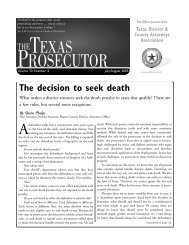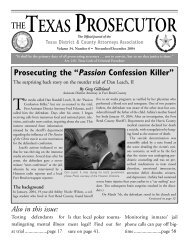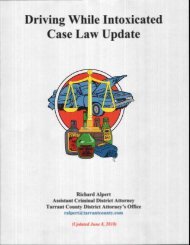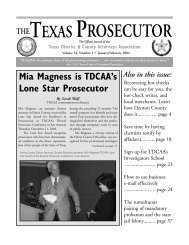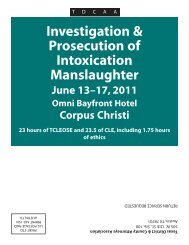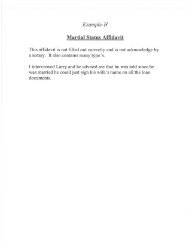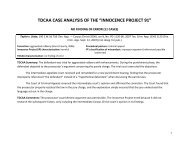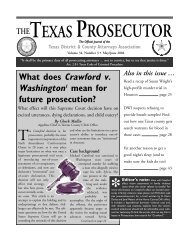Driving While Intoxicated Case Law Update - Texas District ...
Driving While Intoxicated Case Law Update - Texas District ...
Driving While Intoxicated Case Law Update - Texas District ...
Create successful ePaper yourself
Turn your PDF publications into a flip-book with our unique Google optimized e-Paper software.
Foster v. State, 326 S.W.3d 609 (Tex.Crim.App. 2010).<br />
Court of Appeals found insufficient basis for stop. Court of Criminal Appeals reversed finding.<br />
Police had reasonable suspicion to believe that defendant may have been intoxicated, justifying<br />
temporary detention for further investigation when at 1 :30 a.m. a few blocks from city's bar district,<br />
officer observed defendant's truck come up extremely close behind officer's vehicle at red light and<br />
appeared to lurch. Officer then heard a rewing sound and noticed defendant's truck lurch forward<br />
again; in light of the time of night and location, the officer's training and experience, and<br />
defendant's aggressive driving, it was rational for the officer to have infened that the defendant<br />
may have been intoxicated.<br />
Derichsweiler v. State, 2011 WL255299 (Tex.Crim.App. 2011), s.ct. cert. denied, Oct. 3,2011.<br />
The defendant was reported to be stopping next to vehicles in parking lots and staring at the<br />
occupants of those vehicles. That conduct resulted in a 911 callthat ended with the detention and<br />
arrest of the defendant. Ihe r'ssue - was the defendant's non-criminal behavior enough to justify<br />
an investigative stop without reasonable suspicion of a particular offense? The Court said yes,<br />
pointing out there is no requirement to point to a particular offense, but rather reasonable suspicion<br />
that he was about to engage in criminal activity.<br />
State v. Alderete, 314 S.W.3d 469 (Tex.App.-El Paso 2010, pet. ref'd).<br />
Police officers had reasonable suspicion to stop defendant on suspicion of DWl, where defendant<br />
continuously swerved within her lane for half of a mile in the early morning hours, and officers were<br />
trained to detect individuals driving while intoxicated, even if defendant did not violate any traffic<br />
regulation.<br />
Rafaelli v. State, 881 S.W.2 d 7 1 4 (Tex.App.-Texarkana 1994, pet. ref'd).<br />
Weaving in his lane, though not inherentty ittegat act, did provide sufficienf basls for officer to stop<br />
defendant's vehicle.<br />
Dowler v. State, 44 S.W.3d 666 (Tex.App.-Austin 2001, pet. ref'd.).<br />
In support of an anonymous tip, officer also observed defendant weave or drift within his lane of<br />
traffic, touching the outside white tine more than once and once crossing into an on ramp when<br />
defendant had no reason to enter the on ramp. Defendant was also driving twenty miles per hour<br />
below the posted limit and failed to respond when the officer turned on the patrol car's emergency<br />
lights. Officer testified in his experience it is uncommon for sober drivers to drive in that fashion.<br />
Fox v. State, 900 S.W.2d 345 (Tex.App.-Fort Worth 1995), pet. dism'd, improv. granted,930<br />
S.W.2d 607 [Tex.Crim.App. 1996]).<br />
Fluctuating speed and weaving within the lane did provide sufficient basis for officer fo sfop<br />
defendant's<br />
vehicle.<br />
l_5



